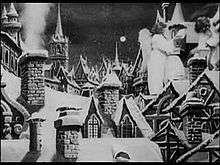The Christmas Dream
| The Christmas Dream | |
|---|---|
 A scene from the film | |
| Directed by | Georges Méliès |
Production company | |
Release dates |
|
| Country | France |
| Language | Silent |
The Christmas Dream (French: Rêve de Noël) is a 1900 French short silent Christmas film directed by Georges Méliès. It was released by Méliès's Star Film Company and is numbered 298–305 in its catalogues, where it was advertised as a féerie cinématographique à grand spectacle en 20 tableaux.[1]
The film, one of Méliès's cinematic contributions to the féerie genre, may have been inspired by a stage production produced in 1897 at the Olympia music hall in Paris.[2] Méliès appears in the film twice, as a magician and as a beggar.[3]
The Christmas Dream includes symbols derived from the Christian tradition, including a sheep and a lion, as well as a motif emblematic of Méliès himself: a jester.[2] The sustained and (for Méliès) atypically serene scene of a church bell ringing also functions as a symbol, readable as a communal ritual of peace seen through a gently nostalgic lens.[4] Special effects used in the film include stage machinery (for the church bell and the Christmas tree that opens up), substitution splices, and dissolves,[3] which are used partially to help connect adjacent spaces, such as the inside of a church followed by the inside of its bell tower.[2]
References
- ↑ Malthête, Jacques; Mannoni, Laurent (2008), L'oeuvre de Georges Méliès, Paris: Éditions de La Martinière, p. 108
- 1 2 3 Abel, Richard (1998), The Ciné Goes to Town: French Cinema, 1896–1914, Berkeley: University of California Press, pp. 70–71
- 1 2 Essai de reconstitution du catalogue français de la Star-Film; suivi d'une analyse catalographique des films de Georges Méliès recensés en France, Bois d'Arcy: Service des archives du film du Centre national de la cinématographie, 1981, pp. 87–89
- ↑ Moen, Kristian (2012), Film and Fairy Tales: The Birth of Modern Fantasy, London: I.B. Tauris & Co, p. 64